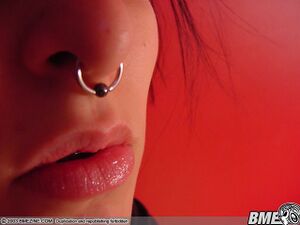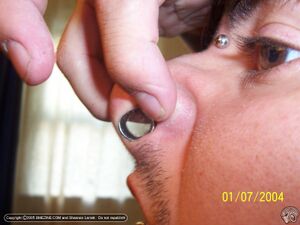Septum Piercing
The septum piercing passes through the nasal septum (the middle of the nose) and is often referred to as a "bull-ring piercing." The nasal septum is the cartilaginous tissue dividing wall between the nostrils. Generally, the cartilage itself is not pierced, but rather the small gap between the cartilage (also known as the "sweet spot") and the bottom of the nose, typically at a gauge no smaller than 14ga (1.6mm).
It should be noted that extreme stretching of the septum will definitely deform the nose, pushing it down and out. This deformity is often referred to as "septum droop." The degree of deformity will differ from person to person depending on their nasal anatomy.
Contents
Placement
The septum piercing passes through the nasal septum (the middle of the nose).
Procedure
Septum piercings are normally performed like a standard needle piercing (sometimes using a septum clamp to help), although dermal punches may be used to create larger gauge piercings. Some advanced artists may also use a scalpel to create or enlarge the piercing to accept much larger jewelry.
Healing and aftercare
The healing time on average is usually 1–3 months. Aftercare is usually salt soaks, 2 times a day.
Jewelry
While captive bead rings and circular barbells are common jewelry, a piece of jewelry called a septum retainer (which is staple shaped) can be worn flipped up inside the nostrils to completely hide the piercing. Septum piercings can come in all sizes ranging from 14g to 1", though 14ga is considered the minimum size. In larger sizes a "septum keeper" or "bullet plug" are both used for comfort.
History and culture
Septum piercings were popular among certain Native American peoples in history; the Shawnee leaders Tecumseh and Tenskwatawa, for example, had such piercings. Septum piercings are also sometimes performed on bulls as part of the process to break them for the farm. This process uses a hinged brass ring with sharpened ends to facilitate insertion. Afterwards, the open ends are held together by means of a screw.
Paul King adds,
- New Guinea is perhaps most famous for septum piercings. The Kangi of New Guinea pierce the septum using a bat bone and sweet potato. During the initiation, the face is blackened with charcoal. The hair on the head is plucked out, all but a tuft. This makes him safe from the magic of women and impervious to death and pain.
- Much tradition and myth is steeped into the Kiman-Papuans of South Irian Jaya. Progressive feasts are offered especially for the male children at stages in the process of loosening connections with their mother. At hair cutting and earlobe, nostril and nasal septum fests, holes are made to wear the ornaments that signify the growing boy's status as a man in the community—for example, the pig's bone through the septum shows that he is a headhunter, and the blood that flows from the piercing is supposed to be womb blood that must be removed symbolically.


